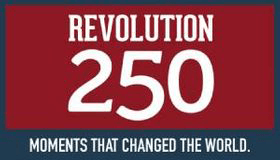Education
Learn About the Revolution
Our member organizations offer a wealth of educational opportunities for students, teachers, and the public. Videos from our “Underrepresented Voices in the American Revolution” Summer Seminar.
1.
Who are the “underrepresented” voices in American history? – Ray Raphael; From July 2, 2019: a conversation with historian and author Ray Raphael discussing his work and book, A People’s History of the American Revolution: How Common People Shaped the Fight for Independence. Plus, Ray Raphel will provide teachers an introduction to Constitutional Sources themes guides (lessons) on ConSource – www.consource.org/lessons /
2.
What were the Framers thinking? – Robert J. Allison; We will explore what the Framers of the Constitution were thinking when the words “We the People” were written in the Preamble of the Constitution of the United States. To whom was “We” referring, according to the Framers?
3.
Constructing historical contexts to the notion of under-represented people – Charlie Newhall; We will define who are the under-represented people in American history, particularly in the histories we teach of the American Revolutionary era. Charlie Newhall will begin raising questions to help construct and develop historical contexts of under-represented voices, and how teachers can help students use primary and secondary sources to incorporate those perspectives.
4.
Who shall write the history of the American Revolution? – Kenneth C. Davis John Adams had it right. “The history of our Revolution will be one continued lie from one end to the other,” he wrote fellow Founder Benjamin Rush in 1790. “The essence of the whole will be that Dr. Franklin’s electrical rod smote the earth and sprang General Washington. That Franklin electrified him with his rod –and thenceforward these two conducted all the policies, negotiations, legislatures, and war.” Winners do write history. But we can do better. My session will focus on how the history was written and how we need to balance the scales.
5.
Women and Children of the American Revolution – Charlie Newhall & Robert J. Allison;
6.
Women and children’s rights and the American Revolution – Holly Brewer, University of Maryland. Dr. Brewer will discuss her book, By Birth or Consent: Children, Law, and the Anglo-American Revolution in Authority, which explores how the changing legal status of children impacted the struggle over consent and status in North America.
7.
Enslaved and Free Africans and African Americans in the American Revolution; Chernoh Sesay, Jr., Bob Allison, and Charlie Newhall; Recorded July 21, 2019. Bob Allison and Charlie Newhall sits down with historian scholar Chernoh Sesay, Jr. (DePaul University) at Suffolk University in Boston discussing free and enslaved Africans during the American Revolution, the Freemasons, and the life of Prince Hall (1738-1807), an African American abolitionist and leader in the free black community in Boston. Chernoh also speaks about how free and enslaved Africans and African Americans during the Revolutionary period made an impact since, particularly leading to the Civil War amendments, Jim Crow era, Modern Civil Rights Movement of the 1950s and 1960s, and the challenges over race that this nation is presently facing today.
8.
Reflections, insights, and takeaways from the conversation with Chernoh Sesay, Jr.; Charlie Newhall, Gorman Lee, and Bethany Jay (recorded July 24, 2019); the paradox of our Founders expressing the necessity of liberty and freedom while keeping enslaved people themselves; understanding and teaching the “hard” history of American slavery.
9.
Slavery in Massachusetts and New England; Bethany Jay, Professor of History at Salem State University, will talk about slavery in Massachusetts and New England – beginning with the Puritans and religious justifications for slavery, moving on to the slavery trade and the 1783 court cases that “ended” slavery in Massachusetts.
10.
Native American tribes engaged in diplomacy, war, ideas, and cultural changes of the Revolutionary era in fundamentally uneven ways. From the Iroquois Confederacy’s support of the British to the Cherokee’s embracing the new Republican ideals, Native peoples shaped the era in their own image. – Charlie Newhall;
